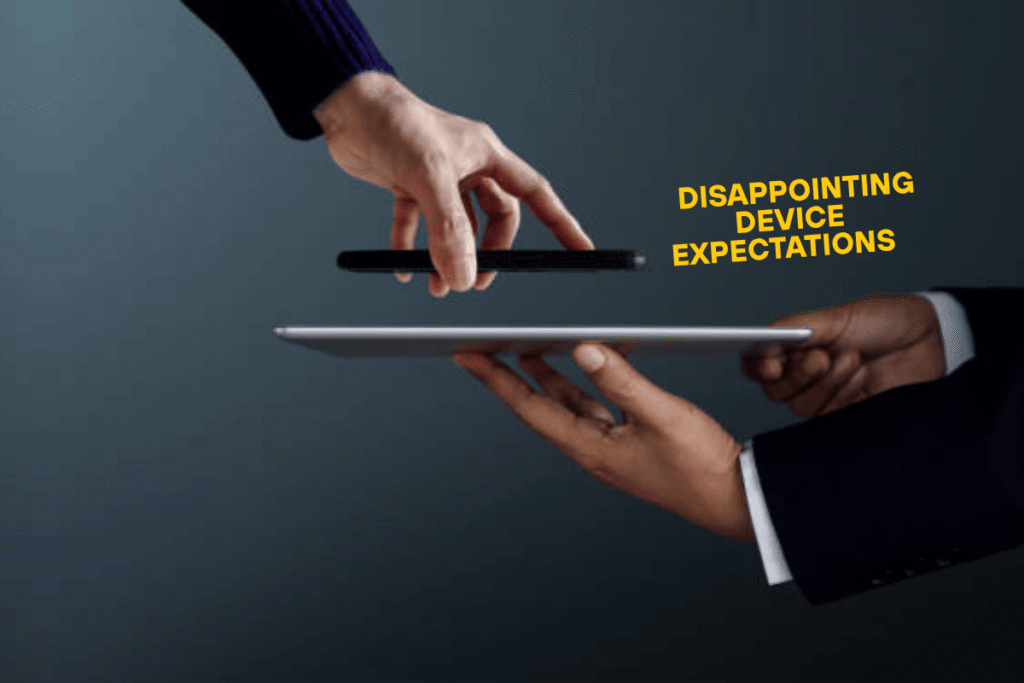
Hello people! Why do many people regret their smartphone purchase decisions? Our daily lives are much different now because smartphones have changed how we communicate, conduct our jobs, pursue education, and have fun. Still, despite its usefulness and ongoing technological updates, reports in The New York Times consistently show that the average consumer ultimately regrets buying a new smartphone. This is not just buyers regretting their purchase after a short time,, but a larger dissatisfaction caused by marketing hype, devices that age quickly, rising costs and other effects we don’t always expect from phones.
A thorough examination will explore the main aspects of owning a smartphone that cause peoplee to regret their purchase, drawing on the New York Times’ routine reporting on such trends. This chapter examines how industry trends, societal pressure, and the evolution of smartphones keep many people dissatisfied, anxious, or searching for something they prefer.
Let’s dive in!
Table of Contents
Marketing drives upgrades, regret

Tech companies utilise sophisticated advertising and supportive media outlets to make everyone feel as though they cannot live without the latest smartphone. Our natural desire for the new, better, and more capable is often portrayed in this story. Keeping an older phone can cause you to miss significant upgrades and make others think you’re not on the same level as them. NYT reporters regularly discuss both the massive advertising and the excitement it generates,, despite questioning whether all the new releases are essential. Most ofwhat I regret comes from the fact that most yearly changes are just minor improvements, not true upheavals.
Although a chip might speed things up by 20% and a camera by adding computational features, these upgrades often have only a slight impact on the overall user experience. But marketing teams still make these more minor updates seem essential.
- For this reason, it’s common to ask, “Was it worth the sacrifice?” a question that is all too often answered with a sad sigh.
- Longer advertisements, the abundance of tech reviews, people promoting products, and bossy friends all contribute to a strong feeling of FOMO.
Planned obsolescence shortens smartphone lifespan
Software obsolescence is the most dangerous form. Even if your device is still functioning correctly, it will eventually stop receiving essential software updates, including security patches and new versions of the operating system. As a result, users are not secure and cannot benefit from updated features or app improvements. According to The New York Times, equipment makers are adopting policies that render older devices obsolete by weakening their performance through software, even making it appear to users that their devices’ batteries are fading faster.
Users are then forced to upgrade more often than they prefer. Batterieswear out over time, and accelerated battery degradation is a leading cause of device failure among many clients. Many people are finding that their phones run out of power much faster these days than they did before.
- As it isn’t cheap or straightforward to fix a phone, many end up buying a new one. The authors typically note that maintaining device functionality can be challenging because batteries tend to degrade over time, and replacing them can be inconvenient.
- Because smartphones are made to be attractive and protected from water, they can be difficult and expensive to fix. Parts are connected using glue, and the company’s elements are found inside; only specialised tools can unlock them.
The Challenge of Speed Traps
Whenever apps add new features, devices that are still effective in most tasks can struggle to handle them. As a result, your phone may run slowly, crash unexpectedly and generally seem sluggish. The combination of these issues means that although technology is naturally evolving, your phone might end up feeling outdated quickly, encouraging you to regret spending all that money for so little.
More Expensive Value of the Ticket

Buying a premium smartphone typically costs around or above $ 1,000. But the expenses don’t stop at the starting amount and can lead to regret. Neww cars and smartphones both tend to lose their value as soon as you make the purchase. Because updates come quickly, older flagship models lose a significant portion of their value when resold within a year.
Older electronics can be challenging to sell, so many users find that trading them in only yields a small portion of their original investment. Users who investt in either the Apple or Android platforms are drawn further away from the competition due to the wide range of their ecosystems.
- This means you can purchase apps, utilise cloud storage, select additional accessories, and connect with other devices, such as watches, tablets, and laptops, for seamless integration.
- If a company has established itself well in an ecosystem, changing to a new brand becomes both difficult and expensive.
- When this occurs, users may feel regretful afterwards if they realise they’d like to accept offers from an opponent but are bound by their past investment.
The Price Listed on the Phone isn’t Everything
Extra fees might add more dollars to your total. Additional items, such as screen protectors, chargers, and extra cables, will increase the cost of your device. Additionally, there are expenses for purchasing contracts with carriers, updating your warranty, and obtaining insurance. Directors may discover that buying these unanticipated costs can cause disappointment and later regrets.
With more people using phones, a noticeable trend is for companies to offer subscriptions instead of a single, full-priced phone, providing premium storage, app features, media streaming, and intelligent AI capabilities. Although these expenditures aren’t quoted in the original price, they still chip away at your budget and may make you wonder about the real usefulness of your smartphone.
Problems Related to Psychology
Smartphones have a significant impact on the way people and groups behave, and their influence is thoroughly explored in numerous New York Times articles. The more severe form of regret stems from the impact of phones on our mental health, productivity, and social life.
Smartphones are carefully designed to capture and hold your attention easily. Companies use messages, never-ending feeds and fun ways to interact to demand our attention. The Times has written extensively about smartphone addiction, taking electronic breaks and how always being on your phone leads to anxiety, difficulty sleeping and shorter attention span.
- Many users wish they spent less time on their phones, were less likely to check them often and experienced being more free from them.
- Smartphones enhance our productivity, although they also distract us from our work.
- All the notifications we receive regularly, as well as the time spent on social media and entertainment programs, can impact our ability to focus.
Being “always on”
The presence of the smartphone greatly increases the pressure to respond to work matters at all times and in all places. Who doesn’t reply to emails late at night or answer business texts on Sundays? All this makes it tough to relax and can cause severe stress. The newspaper reported on digital boundaries and the pressure to be constantly accessible, which has led some workers to regret not having more free time to relax.
Chasing ideal, disappointing device expectations

People also regret smartphones because what they expect from them doesn’t always match their performance, and many continue to hope for the perfect phone.
Leaving aside the Real Challenges, Many marketing campaigns aim to make technology appear seamless and easy to handle. Users often encounter issues such as applications stopping, problems with features, connection problems, and unexpected crashes. Although these issues are usually minor, they can accumulate, and customers may feel disappointed that their smartphone doesn’t perform as advertised.
The More Is Less Problem
Since smartphones today offer numerous features, many users are unaware of them or rarely use them. Due to the issue, smartphones can become complicated, consume space and battery, yet fail to offer clear improvements. In some cases, people may regret spending on features they won’t use. The New York Times reports that modern technology can often be complex for users to comprehend and utilise.
Searching for the Perfect
If a phone’s advertising lets us believe a snap of a camera will look like something a professional takes, that’s not always realistic. Most users never get pictures that look exactly like those in product ads because real-life situations and their skills, along with poor light, prevent it, causing many to feel let down by their costly camera choices.
There is now a growing concern about buying based on how rapidly technology is evolving. Knowing that taking home an iPhone 11 this year will likely see it quickly replaced once the iPhone 12 launches makes people view their purchase less as an investment and more as something doomed to quick depreciation.
Conclusion
The newspaper’s frequent observations reveal a mix of praise and criticism for smartphones among consumers. With all the benefits smartphones offer, the way the industry operates and natural human behaviour often result in buying a phone, feeling excited, and later being unhappy with the purchase.
The reason for this is the impression that main features wear out quickly, products become outdated fast, costs may surprise you, and being connected all the time can be mentally straining. When people become more aware of the environment, they also start to feel worse about their part in e-waste.
All this coverage in the New York Times makes it clear that to end the curse of regret, consumers need to change their habits completely. How can you avoid smartphone regret, according to the NYT?
FAQS
1: Why do New York Times reporters think people end up regretting buying a smartphone?
People often wish they hadn’t bought phones with weaker batteries, fewer software updates, or a higher price.
2: Why are some phone features more likely to cause buyers to regret their purchase?
Buyers are often let down by designs that are easy to damage, have limited storage, and subpar camera capabilities.
3: Is there NYT advice to hold off on buying trendy phones that offer strange or unique features?
Yes, according to The New York Times, it’s best to focus on what works every day instead of what is trending at the moment.
4.According to the report, how can buyers prevent later regrets about buying a smartphone?
Do your research, pay attention to what you need and rely on trustworthy expert comments.
5: Are high-cost smartphones always a good deal?
That’s not always the case—mid-range phones regularly give more value for the price you pay.




Leave a Reply